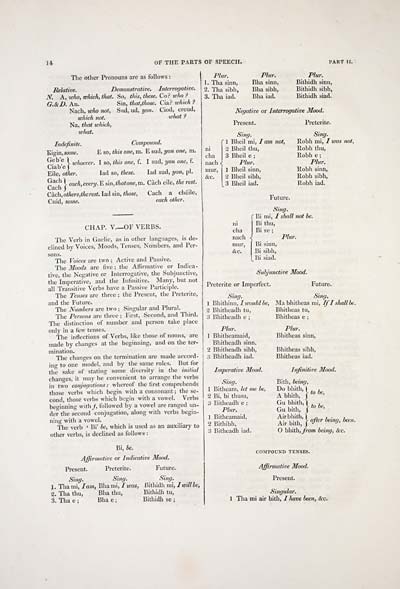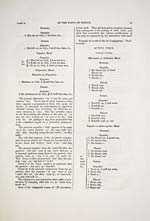Download files
Complete book:
Individual page:
Thumbnail gallery: Grid view | List view

OF THE PARTS OF SPEECH.
The other Pronouns are as follows :
Relative. Demonstrative. Interrogative.
N. A, who, which, t/uzt. So, this, these. Co? wfio ?
G.&D. An. Sin, that,tfu)se. Cia? which ?
Nach, wlw not, Siid, ud, yon. Ciod, creud,
which not. w'utt ?
Na, that which,
what.
Lukfinite. Compound.
Eigin,«o»«?. E so, this one, m. E sud, yon one, m.
^P^'f I whoever. I so, this one, f. I sud, yon one, f.
CiabeJ
Eile, other. lad so, these. lad sud, yon, pi.
5^'^]' I eacLevertj.E sin, ffiatone,m. Càch eile, the rest.
Cach j , ,.,
Càch,otfiers,therest.laàsm,tIwse, Cach a cheile,
Cuid, sotne. each other.
CHAP, v.— OF VERBS.
The Verb in Gaelic, as in other languages, is de-
clined by Voices, Moods, Tenses, Numbers, and Per-
Tlie Voices are two ; Active and Passive.
The Moods are five; the Affirmative or Indica-
tive, the Negative or Interrogative, the Subjunctive,
the Imperative, and the Infinitive. Many, but not
all Transitive Verbs have a Passive Participle.
The Tenses are three ; the Present, the Preterite,
and the Future.
The Numbers are two ; Singular and Plural.
The Persons are three ; First, Second, and Third.
The distinction of number and person take place
only in a few tenses.
The inflections of Verbs, like those of nouns, are
made by changes at the beginning, and on the ter-
mination.
The changes on the termination are made accord -
inn- to one model, and by the same rules. But for
the sake of stating some diversity in the initial
changes, it may be convenient to arrange the verbs
in two conjugations : whereof the first comprehends
those verbs which begin with a consonant ; the se-
cond, those verbs which begin with a vowel. Verbs
beginning with/, followed by a vowel are ranged un-
der the second conjugation, along with verbs begin-
Bi' be, which is used as an auxiliary to
declined as follows :
Plur. Plur.
1. Tha Sinn, Bha sinn,
2. Tha sibh, Bha sibh,
" Tha iad. Bha iad.
ning with a vowel.
Plur.
Bithidh sinn,
Bithidh sibh,
Bithidh siad.
Affirmative or Indicative Mood.
Present. Preterite. Future.
Sing. Sing. Sing.
1 . Tha mi, lam, Bha mi, / was, Bithidh mi, IwUl be,
2. Tha thu, Bha thu, Bithidh tu,
3. Tha e ; Bha e ; Bithidli se ;
Negatii
Present.
Sing.
1 Bheil mi, /fl
2 Bheil thu,
3 Bheil e ;
Plur.
Ì Bheil sinn,
2 Bheil sibh,
3 Bheil iad.
r Interrogative Mood.
Preterite.
Sing,
am not, Robh mi, / ic
Robh thu,
Robh e ;
Plur.
Robh sinn,
Robh sibh,
Robh iad.
Sing.
fBi mi, I shall not he.
I Bi thu,
Preterite or Imperfect.
1 m^\thmn,iioouldbe,
2 Bhitheadh tu,
3 Bhitheadh e ;
Phtr.
1 Bhitheamaid,
Bhitheadh sinn,
2 Bhitheadli sibh,
3 Bhitheadli iad.
Imperative Mood.
Sing.
1 Bitheam, let me be,
2 Bi, bi thusa,
3 Bitheadh e ;
Plur.
1 Bitheamaid,
2 Bithibh,
3 Bitheadh iad.
Future.
Mabhitheas mi. If I shall be.
Bhitheas tu,
Bhitheas e ;
Plur.
Bhitheas sinn,
Bith, being.
Do bhith, \ ,
A bhith, j" '" "^'
Gu bhith, Ì , .
Gu bith I '
Air bhith, Ì n ?, ■ .
Air bith, r-^'**"'^'*^'
O hhithjjrom being, &c.
COMPOUND TENSES.
Affirmative Mood.
Present.
Singular.
1 Tha mi air bith, / have been, &c.
The other Pronouns are as follows :
Relative. Demonstrative. Interrogative.
N. A, who, which, t/uzt. So, this, these. Co? wfio ?
G.&D. An. Sin, that,tfu)se. Cia? which ?
Nach, wlw not, Siid, ud, yon. Ciod, creud,
which not. w'utt ?
Na, that which,
what.
Lukfinite. Compound.
Eigin,«o»«?. E so, this one, m. E sud, yon one, m.
^P^'f I whoever. I so, this one, f. I sud, yon one, f.
CiabeJ
Eile, other. lad so, these. lad sud, yon, pi.
5^'^]' I eacLevertj.E sin, ffiatone,m. Càch eile, the rest.
Cach j , ,.,
Càch,otfiers,therest.laàsm,tIwse, Cach a cheile,
Cuid, sotne. each other.
CHAP, v.— OF VERBS.
The Verb in Gaelic, as in other languages, is de-
clined by Voices, Moods, Tenses, Numbers, and Per-
Tlie Voices are two ; Active and Passive.
The Moods are five; the Affirmative or Indica-
tive, the Negative or Interrogative, the Subjunctive,
the Imperative, and the Infinitive. Many, but not
all Transitive Verbs have a Passive Participle.
The Tenses are three ; the Present, the Preterite,
and the Future.
The Numbers are two ; Singular and Plural.
The Persons are three ; First, Second, and Third.
The distinction of number and person take place
only in a few tenses.
The inflections of Verbs, like those of nouns, are
made by changes at the beginning, and on the ter-
mination.
The changes on the termination are made accord -
inn- to one model, and by the same rules. But for
the sake of stating some diversity in the initial
changes, it may be convenient to arrange the verbs
in two conjugations : whereof the first comprehends
those verbs which begin with a consonant ; the se-
cond, those verbs which begin with a vowel. Verbs
beginning with/, followed by a vowel are ranged un-
der the second conjugation, along with verbs begin-
Bi' be, which is used as an auxiliary to
declined as follows :
Plur. Plur.
1. Tha Sinn, Bha sinn,
2. Tha sibh, Bha sibh,
" Tha iad. Bha iad.
ning with a vowel.
Plur.
Bithidh sinn,
Bithidh sibh,
Bithidh siad.
Affirmative or Indicative Mood.
Present. Preterite. Future.
Sing. Sing. Sing.
1 . Tha mi, lam, Bha mi, / was, Bithidh mi, IwUl be,
2. Tha thu, Bha thu, Bithidh tu,
3. Tha e ; Bha e ; Bithidli se ;
Negatii
Present.
Sing.
1 Bheil mi, /fl
2 Bheil thu,
3 Bheil e ;
Plur.
Ì Bheil sinn,
2 Bheil sibh,
3 Bheil iad.
r Interrogative Mood.
Preterite.
Sing,
am not, Robh mi, / ic
Robh thu,
Robh e ;
Plur.
Robh sinn,
Robh sibh,
Robh iad.
Sing.
fBi mi, I shall not he.
I Bi thu,
Preterite or Imperfect.
1 m^\thmn,iioouldbe,
2 Bhitheadh tu,
3 Bhitheadh e ;
Phtr.
1 Bhitheamaid,
Bhitheadh sinn,
2 Bhitheadli sibh,
3 Bhitheadli iad.
Imperative Mood.
Sing.
1 Bitheam, let me be,
2 Bi, bi thusa,
3 Bitheadh e ;
Plur.
1 Bitheamaid,
2 Bithibh,
3 Bitheadh iad.
Future.
Mabhitheas mi. If I shall be.
Bhitheas tu,
Bhitheas e ;
Plur.
Bhitheas sinn,
Bith, being.
Do bhith, \ ,
A bhith, j" '" "^'
Gu bhith, Ì , .
Gu bith I '
Air bhith, Ì n ?, ■ .
Air bith, r-^'**"'^'*^'
O hhithjjrom being, &c.
COMPOUND TENSES.
Affirmative Mood.
Present.
Singular.
1 Tha mi air bith, / have been, &c.
Set display mode to: Large image | Transcription
Images and transcriptions on this page, including medium image downloads, may be used under the Creative Commons Attribution 4.0 International Licence unless otherwise stated. ![]()
| Early Gaelic Book Collections > Blair Collection > Dictionarium scoto-celticum > Volume I > (38) |
|---|
| Permanent URL | https://digital.nls.uk/76575995 |
|---|
| Description | Lacks half title page in Volume 1. |
|---|---|
| Attribution and copyright: |
|
| Description | A selection of books from a collection of more than 500 titles, mostly on religious and literary topics. Also includes some material dealing with other Celtic languages and societies. Collection created towards the end of the 19th century by Lady Evelyn Stewart Murray. |
|---|
| Description | Selected items from five 'Special and Named Printed Collections'. Includes books in Gaelic and other Celtic languages, works about the Gaels, their languages, literature, culture and history. |
|---|

